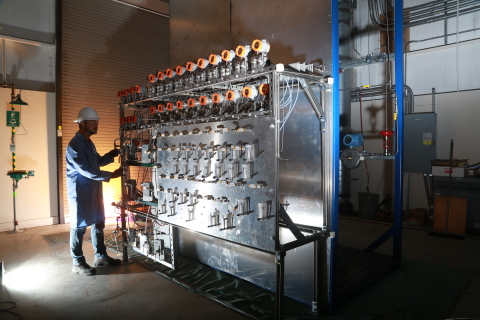EcoCatalytic Successfully Scales Up New Ethylene Production Process That Reduces CO2 Emissions by Over 80%
EcoCatalytic Inc. has successfully scaled-up a new, lower environmental footprint process for the production of a key petrochemical building block. Commercialized, EcoCatalytic’s new process will reduce CO2 emissions for ethylene production by over 80% compared to conventional steam cracking. In addition, EcoCatalytic’s process has essentially no NOx emissions, another major environmental concern with the conventional process.
This press release features multimedia. View the full release here: https://www.businesswire.com/news/home/20200611005128/en/

Feed control system for EcoCatalytic’s new ethylene process pilot unit at Southwest Research Institute (Photo: Business Wire)
Commercial steam cracking is a high-temperature and energy-intensive process, producing up to 1.5 tons of carbon dioxide emissions per ton of product. Estimates place annual CO2 totals from steam cracking at 60 million tons in the U.S. and over 260 million tons globally. EcoCatalytic has numerous issued and pending patents on key aspects of its transformational replacement technology, based on Chemical Looping Catalysis, and continues its research and scale-up efforts.
In this highly efficient looping process, a proprietary metal oxide oxygen transfer agent provides the oxygen for the selective conversion of ethane to ethylene and water in the first reactor bed. The metal oxide is then re-oxidized with air in the second reactor bed, regenerating the oxygen transfer agent and supplying the necessary heat for the process. Overall, this results in 80% fewer CO2 emissions than conventional steam cracking furnaces, and has lower heat demand.
The oxygen transport agent separates oxygen from air and selectively oxidizes in-situ-generated hydrogen that results from conversion of hydrocarbons to ethylene and other olefins. “This oxygen transport agent functions like hemoglobin in respiration, but at a much higher temperature and much larger scale,” explains John A. Sofranko, PhD, CEO and founder of EcoCatalytic Inc. “We are extremely proud of this groundbreaking project, which aims to dramatically improve the sustainability of the production of ethylene, a key building block for the petrochemical industry in the U.S. and globally.”
The technology development is funded by a $2 million grant from the U.S. Department of Energy’s Advanced Manufacturing Office, within the Office of Energy Efficiency and Renewable Energy, and an additional $2 million in company matching contributions. EcoCatalytic has verified their laboratory-scale results in a 1,000-fold scale-up pilot unit at Southwest Research Institute (SwRI) in San Antonio. SwRI fabricated, built-up and currently operates the pilot unit. A leading catalyst supplier manufactured the proprietary catalyst used in the process.
Feed control system for EcoCatalytic’s new ethylene process pilot unit at Southwest Research Institute
EcoCatalytic, located in Woburn, Massachusetts, develops sustainable technologies for the conversion of natural and bio-based gas to marketable liquid fuels, chemicals and electrical power. It is also developing technology for the chemical recycling of plastic waste. EcoCatalytic was founded in 2009 by Dr. John Sofranko. Before starting the company, Sofranko worked most of his career in research and development in the natural gas industry. In the 1980s, he helped invent the process that turns natural gas into gasoline. He is an inventor on more than 100 U.S. and foreign patents in process catalysis and engineering.
View source version on businesswire.com: https://www.businesswire.com/news/home/20200611005128/en/




